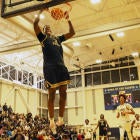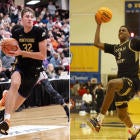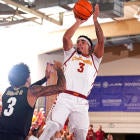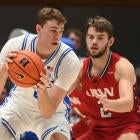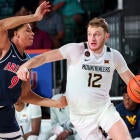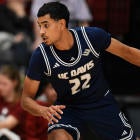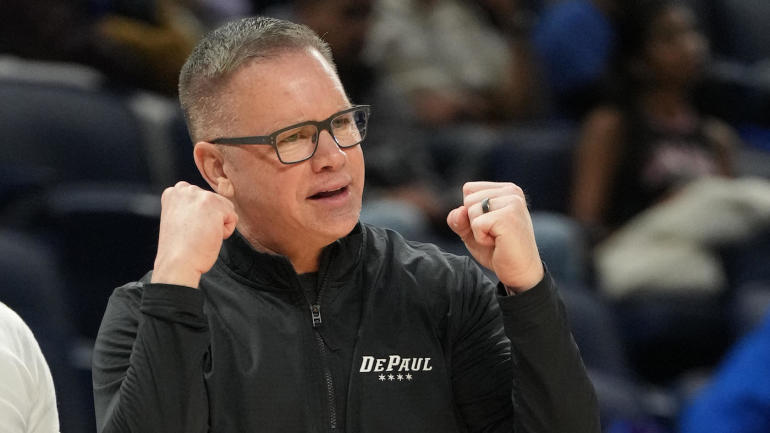
CHICAGO -- It's the question he can't stop getting. From the day Chris Holtmann took the job earlier this year (March 14), then throughout the spring, all summer long and well into the fall, people just have to know.
Why did you do this? Why did you -- HOW could you -- take the DePaul job?
"I'm telling you, in every interview, that has been the question that I've been asked," Holtmann recently told CBS Sports.
And it wasn't just media folk prodding. People from all directions and backgrounds would inquire. What's the deal here? Is this some sort of peculiar dare or charity case? Were you forced against your will to do this? Of all the jobs … DePaul? Some might tilt their heads, as if not to offend. Others invoked a softer tone, like how you'd talk to someone just getting over the flu.
"It's been fascinating for me," Holtmann said as we talked about The Question over lunch at Homeslice -- a restaurant two blocks from DePaul's campus -- in October. As he begins to explain his new life and the decisions that led to it, an L train drowns him out as it thunderously chuk-chuks just outside the restaurant.
"Still haven't gotten used to that," he says amid the decrescendo.
This is the first time Holtmann's ever truly lived within a big city, and there's a lot to get used to. The best of it: Holtmann has a 10-minute commute by foot to work. He walks home for lunch some days. The best part has been exploring Chicago with his wife and 14-year-old daughter. He can blend in as an everyman amongst the winsome neighborhoods of Lincoln Park. But that's life, not the job.
His team was predictably picked last in the Big East preseason poll and Holtmann was all too content to slink under the radar while starting his fourth head-coaching gig. But even with shin-high expectations, there was little chance of that given the contrast in what he's done and what DePaul most certainly hasn't over the past 15 years (and beyond). Holtmann was the best-case hiring scenario for the program when athletic director DeWayne Peevy convinced the former Ohio State/Butler/Gardner-Webb coach to take over what has been, without peer, the worst power-conference program this century.
The Blue Demons last made the NCAA Tournament in 2004, a drought that is bested by a whopping 263 programs. In that span, DePaul's record was 231-391. Since moving to the Big East in 2005, it has one winning season in league play (9-7 in 2006-07). What's more, Holtmann took this job after the nadir. For as laughable as DePaul has been, nothing was worse in its 102-year history than last season when the Blue Demons went 3-29 and finished 308th at KenPom, the lowest ranking for any school in a high-major league in the 28-year database of that metric.
"I'm under no illusions that this is going to be easy," Holtmann said. "Like, I get it."
Holtmann, who was fired on Valentine's Day by Ohio State athletic director Gene Smith after going 30-30 in his final 60 games, has 254 wins and seven NCAA Tournament appearances on his résumé. Of all the rumored names connected to the DePaul job after Peevy fired Tony Stubblefield in January, Holtmann was by far the most accomplished candidate. Some in the industry thought DePaul didn't have a shot. Plus, Holtmann could easily sit a year or two, wait for a better job and likely get it.
But the Ohio State firing hit him like a maul, even in spite of OSU's spiraling season and him losing grip on the program. He thought he'd have time to reverse course; too many forces rallied against him. He did initially consider taking a year away from coaching, but then he took trips to see friends in the profession as they made their pushes toward March. He flew to FAU to see Dusty May -- the now-Michigan coach wanted to know the ins and outs of the then-vacant Ohio State job. Holtmann visited Takayo Siddle (a former Holtmann assistant) at UNC Wilmington, in addition to his former assistant Ryan Pedon, now the coach at Illinois State. Holtmann also flew to Texas A&M and spent three days with Buzz Williams. They held at-dawn workouts and took daily walks that would last two hours. Holtmann got to see the good, the bad, the unusual at other places.
"It was cathartic for me," he said, adding that he even wound up counseling Williams a little as he was pushing through the dog days of February. "That ended up being probably as good as anything for me."
Not having the stress of coaching a team held its appeal … for less than a month. A couple of humdrum days around the house settled the matter. With his only child set to go into high school, if he was going to take a job, this needed to be the year to do it. He wouldn't move her twice.
So, why DePaul?
Holtmann takes a beat and puts it plainly.
"I'm kind of an asshole when I'm bored," he said. "I don't have enough hobbies. I just think I can be irritable. … For me, I don't know how I'd be not having a team, not having a purpose for a year. And if there's a couple opportunities, or an opportunity that kind of grabs my heart, then I need to take advantage of that."
To Holtmann's surprise, DePaul pulled at him. Even as those close to him were advising against it, the insane challenge of returning DePaul to respectability -- not even prominence, just downright competency -- was attractive. Peevy and DePaul president Robert L. Manuel visited the Holtmann home in late February. The three of them sat at the dining room table for hours. It was enough to get him to consider a job with one above-.500 season in the previous 17. For more than a decade DePaul has been a non-entity for almost every four- or five-star recruit from greater Chicago. Fixing that appealed to Holtmann on a level he didn't fully understand, to the point where he asked a sports psychologist for clarity. He sent back to Holtmann's JFK's famous "Why go to the moon?" speech.
"As humans, we aspire to do hard and difficult things, and can be very gratifying when you see that thing through," Holtmann said.
Holtmann got the assurances and conditions required before accepting, and to Peevy's credit, he knows his job is on the line with this hiring as well. To that end, DePaul's NIL budget has purportedly snowballed and is no longer paltry. In agreeing to a six-year deal, Holtmann also gave up some of his own would-be salary to increase the pool for his staff to be at a competitive level in the Big East. Most importantly, assurances were made about a new practice facility and offices, which needed to be done in less than three years' time to build a literal foundation for momentum. Earlier this month, DePaul announced a $2.5 million donation for the project. Ground will be broken in 2025.
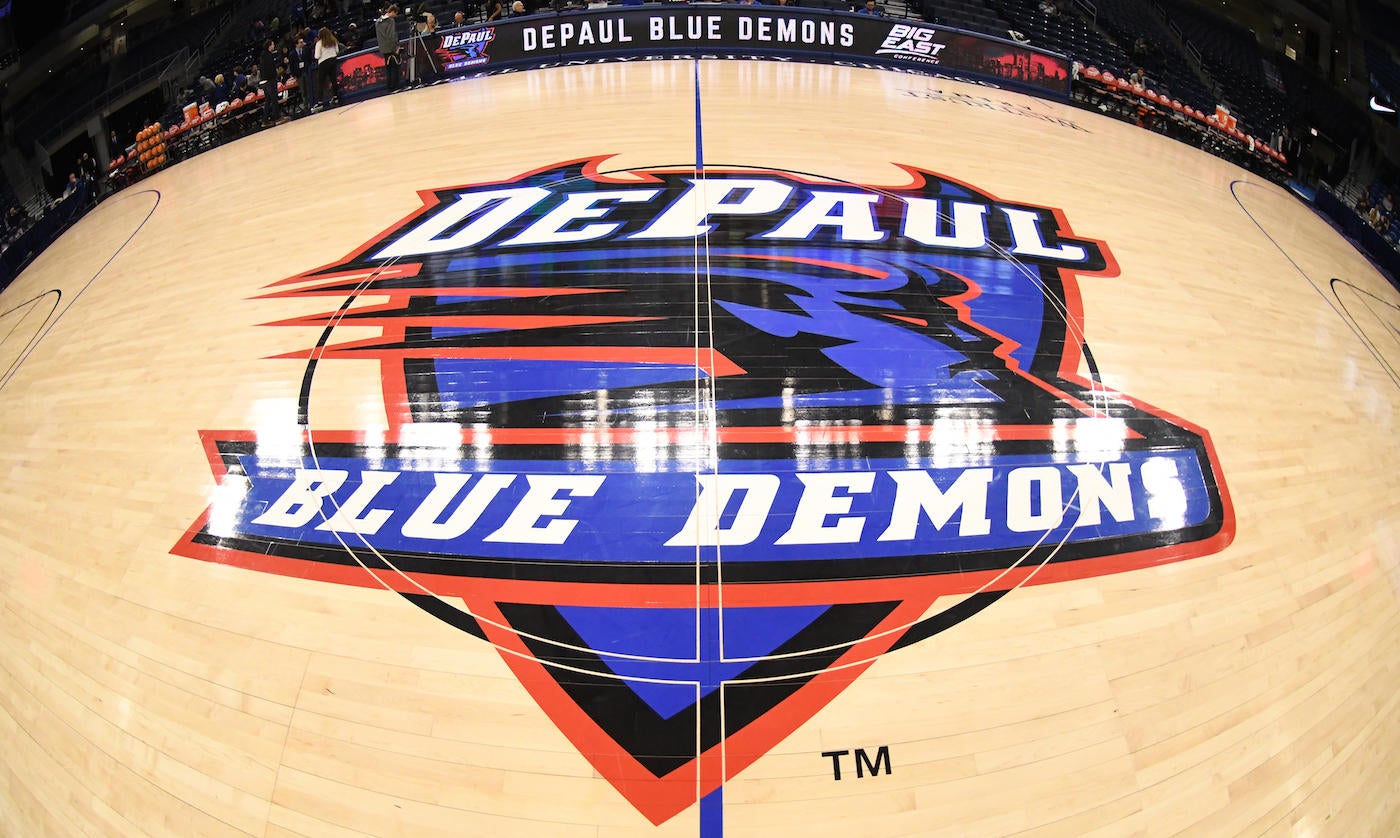
It helps that Holtmann has done rebuilds before, albeit on different scales. The closest analog was his first year as a head coach in 2010-11 at Gardner-Webb. The team went 11-21. He made a rule. You can acknowledge the challenges of the job in front of you, but you can't dwell on them amongst the staff, otherwise you'll face significant consequences. There are few things college basketball coaches love to do more than bitch; it is part of the job description. But to Holtmann, dwelling about issues as a hobby and living in that woe-is-us can fester in a team's facility and infect a program from the core out. The same rule applies to DePaul now.
"We're going to recognize it, see if it's fixable, but we're also going to acknowledge and celebrate the areas that we think this place can be really good," Holtmann said.
Three games into this season, it's a welcomed change of pace. The losses will come and will likely pile high in Year 1, but DePaul is 3-0 heading into its Friday home tilt against Duquesne. The team's won a pair of games by 30-plus points to start the season, something DePaul hadn't done since 1999-00. Lookie there: immediate progress. This spring/summer, the program sold more season tickets than at any point in the seven-year history of Wintrust Arena. That was big, because while DePaul has a really nice home joint, it's also more than 20 minutes from campus. Back when Holtmann was coaching Butler, there'd be games at DePaul where BU fans would outnumber the home team.
"I remember thinking, man, I bet that's hard on the staff and players," Holtmann said.
Maybe this can finally be the pivot point. Maybe DePaul doesn't have to be the laughingstock of college basketball. For as strong of a hire Holtmann was to DePaul, he also brought on a staff that's got loads of experience, which is crucial at a place prone to massive disappointments. In addition to keeping Paris Parham as an assistant, Holtmann hired three guys with head coaching experience: former Miami University Jack Owens, former Southern Illinois coach Bryan Mullins and former Butler coach LaVall Jordan, who is the team's general manager. Jordan actually reached out to Holtmann first. He'd done TV the past two years, but the gym was calling him once again.
Said Holtmann: "I'm not sure there's a more important, critical issue when it comes to winning and losing consistently right now than roster construction. Does the roster fit the head coach? Does it fit his style of play, and where can he morph it a little bit? Does he fit in terms of personality? It is so critical."
In building out the team, Holtmann wanted as many multi-year transfers as possible. No final-year eligibility guys. There has to be carryover. The first player to commit was Troy D'Amico, a Chicago native who played for Mullins at SIU.
"I want guys who want to be at DePaul, and people are going to laugh, there might be a little bit of a chuckle when, when I say that," Holtmann said.
Always aware of where DePaul stands, Holtmann charged himself and his staff with building up the place in an authentic way and never losing sight of where DePaul is now in the pecking order of the sport, even in the Big East. They didn't get involved in one portal battle they couldn't win. The roster is patchwork, but so it goes for most teams in a coaching transition. The goal is to clear double-digit wins without issue and build from there, ideally with at least 75% of the roster returning for 2025-26.
Take Drake transfer Connor Enright as an example. His coach left for West Virginia. Enright grew up an hour from DePaul and had an immaculate reputation. Won on NCAA Tournament teams but averaged 6.9 points, 3.2 assists and 3.2 rebounds.
"He's going to really embody what we want this new program to be about," Holtmann said. "So I recruited him like a five-star point guard, like the highest-level point guard in the transfer portal."
Enright's averaging 6.3 assists to start the season and could grow into one of the best pass-first guards in the Big East.
For DePaul to have already matched last year's win total in the first nine days of the season is as funny as it is sad. The program should have never reached this point, but then, maybe it needed to in order to finally find a way out of its vortex of suck. Holtmann now sees how badly people want DePaul to matter in a way he didn't understand in March. That juxtaposed against the risk of it all is what makes this so compelling. There's a chance it goes terribly for Holtmann the way it went terribly for most every coach to run this program since the '90s. If that happens, he'll probably never be a head coach again. He understands that proposition.
"What comes with it requires a willing courage to say, 'Yep, I'm gonna put myself back out there,'" Holtmann said. "And I have no problem with people who are, like, I'm not gonna do it, not for me or I need a break. I don't ever look at those things, and people can say what they want about somebody who yells something at a game or whatever, and I just look at it and say we willingly make these decisions and got to be tough enough to handle them."
This could be a mistake … or it could be the best decision of Holtmann's career. That's the driving point. If Chris Holtmann can get DePaul back to the NCAA Tournament for the first time in more than two decades, it will amount to one of the best turnaround stories in college basketball this century. The scale and challenge of such an assignment feeds the human ego -- Holtmann's ego -- and that can be a healthy thing because it's in service to others.
That's the risk. That's why you do it. The harder it is, the more rewarding it can be. That's why he took the DePaul job.










